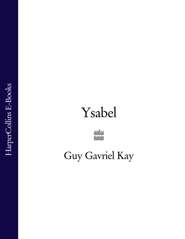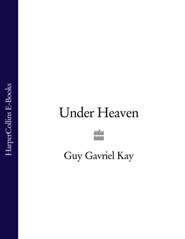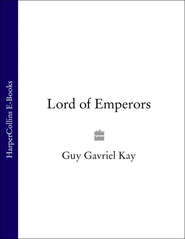По всем вопросам обращайтесь на: info@litportal.ru
(©) 2003-2025.
✖
The Lions of Al-Rassan
Автор
Год написания книги
2019
Настройки чтения
Размер шрифта
Высота строк
Поля
“You aren’t old,” her daughter said quickly.
“Of course I am. And of course I won’t hold you back. If you aren’t raising my grandchildren in a house around the corner by now, I have only myself and your father to blame for the way we brought you up.”
“To think for myself?”
“Among other things.” The smile again, unexpectedly. “To try to think for almost everyone else, I fear. I’ll pack some things for you and order a place set for Husari at table. Is there anything he shouldn’t eat tonight?”
Jehane had shaken her head. Sometimes she found herself wishing her mother would give vent to her emotions, that there might be a storm, after all. But mostly she was grateful for the nearly unbroken control that Eliane had displayed since that terrible day in Cartada four years ago. She could guess at the price of that restraint. She could measure it within herself. They weren’t so very different, mother and daughter. Jehane hated to cry; she regarded it as a defeat.
“You’d better go upstairs,” Eliane had said.
She had come upstairs. It was usually like this. There was seldom any pain in talking with her mother, but it never seemed as if the things that needed to be said were said. This afternoon, though, was not the time to be addressing such matters. Something very hard was still to come.
She knew that if she hesitated too long her resolve to leave might yet falter on this, the most difficult threshold of the day, of all her days. Jehane knocked twice, as was her habit, and entered the shuttered darkness of her father’s study.
The candle lent its necessary glow to the books bound in leather and gold, the scrolls, the instruments and sky charts, the artifacts and mementos and gifts of a lifetime of study and travel and work. Its light fell, no longer wavering in her hand, upon a desk, a plain northern-style wooden chair, cushions on the floor, another deep chair—and the white-bearded man in the dark blue robe sitting motionless there, his back to the door and his daughter and the light.
Jehane looked at him, at the spear-like rigidity of his posture. She noted, as she noted every single day, how he did not even turn his head to acknowledge her entry into the room. She might as well not have entered, with her light and the tale she had to tell. It was always this way, but this afternoon was different. She had come to say goodbye and, looking at her father, the long sword of memory lay in Jehane’s mind, hard and bright and terrible as the knives the Muwardis must have used.
Four years ago, the fourth son of King Almalik of Cartada had been twisted around his own birth cord in the womb of his mother. Such infants died and, almost invariably, the mother did as well. Physicians knew the signs well enough to be able to warn of what was coming. It happened often enough; no blame would attach. Childbirth was one of the dangerous things in the world. Doctors could not do the miraculous.
But Zabira of Cartada, the musician, was the favored courtesan of the most powerful of all the city-kings in Al-Rassan, and Ishak of Fezana was a brave and a brilliant man. After consulting his charts of the heavens, and sending word to Almalik that what he was about to try offered only the slimmest hope, Ishak had performed the only recorded delivery of a child through an incision in the mother’s belly while preserving the life of the mother at the same time.
Not Galinus himself, the source and fount of all medical knowledge, not Uzbet al-Maurus, not Avenal of Soriyya in the Asharite homelands of the east—not one of them, or any who had followed after, had reported successfully doing such a thing, though these three had noted the procedure, and each of them had tried.
No, it was Ishak ben Yonannon of the Kindath who first delivered a living child in such a way, in the palace of Cartada in Al-Rassan in the second decade after the fall of the Khalifate. And then he had healed the mother of her wound and tended her after, so that she rose from her bed one morning, very pale but beautiful as ever, to reclaim her four-stringed lute and take her accustomed place in Almalik’s reception hall and his gardens and private chambers.
For this act of courage and skill on a scale never before known, Almalik of Cartada had gratefully offered a quantity of gold and a gift of property such as to leave Ishak and his wife and daughter secure for the rest of their lives.
Then he had ordered the physician’s eyes put out and his tongue cut off at the root, that the forbidden sight of an Asharite woman’s nakedness be atoned for, that no man might ever hear a description of Zabira’s milk-white splendor from the Kindath doctor who had exposed her to his cold glance and his scalpel.
It was an act of mercy, of a sort. The ordained punishment for a Jaddite or a Kindath who feasted lecherous eyes on the unclothed figure of an Asharite woman who was bride or concubine to another man was, as everyone knew, the death between horses. And this woman belonged to a king, the successor to khalifs, the Lion of Al-Rassan, from whose presence all lesser kings fled.
The wadjis, seeing an opportunity, had begun demanding that death in temple and marketplace the moment the story of the birth escaped the palace. Almalik, however, was genuinely grateful to his Kindath physician. He had always disliked the wadjis and the demands they made of him and he was—by his own assessment, at any rate—a generous man.
Ishak lived, blind and mute, sunken far into the stony depths of an inwardness his wife and only child could not reach. Not in those first days, not after, could he be roused to any response.
They brought him home from Cartada to their house in his long-since chosen city of Fezana. They had more than enough to sustain themselves; indeed, by any measure at all they were wealthy. In Silvenes, in Cartada, in his private practice here, Ishak had been hugely successful, and as much so in business ventures with Kindath merchants trading east in leather and spices. Almalik’s last bounty merely set the seal on their worldly success. They were, it could have been said, blessed by the moons with great good fortune.
Jehane bet Ishak, child of such fortune, walked into her father’s room, laid her candle down on the table and pulled back the shutters of the eastern window. She pushed open the window as well, to let the late afternoon trace of a breeze come in with the soft light. Then she sat in the wooden chair at the table as was her habit.
The book she was in the midst of reading to Ishak—the text of Merovius on cataracts—lay open by her elbow. Each afternoon, at the end of her day’s work, she would come into this room and tell her father about the patients she had seen, and then read aloud from whatever text she was studying herself. Sometimes letters came, from colleagues and friends in other cities, other lands. Ser Rezzoni wrote several times a year from Sorenica in Batiara or wherever else he was teaching or practising. Jehane would read these to her father, as well.
He never responded. He never even turned his head towards her. It had been so from the night he was marred. She would tell him about her day, read the letters, read her texts aloud. She would kiss him on the forehead when she left to go down for dinner. He never responded to that, either.
Velaz brought Ishak his meals in this room. He never left this room. He would not—unless they forced him—ever leave this room, Jehane knew. His voice had been deep and beautiful once, his eyes clear and blue as the river in sunlight, bright doorways to a grave depth of thought. The grace of his mind and the skill of his hands had been bestowed without stinting or hesitation upon all who asked or had need. He had been proud without vanity, wise without trivial wit, courageous without bravado. He was a shell, a husk, a blind, mute absence of all these things in a room without light.
In a way, Jehane thought—looking at her father, preparing to say goodbye—pursuing this vengeance, however belated, against Almalik of Cartada was the most obvious thing she had ever done.
She began. “Market day today. Nothing too difficult. I was about to see a quarry laborer with what looked to be gout—if you can believe it—when I was called away. I wouldn’t have gone, of course, but it turned out to be Husari ibn Musa—he was passing another stone, the third one this year.”
There was no movement in the deep armchair. The handsome, white-bearded profile seemed a carving of a man, not the man himself.
“While I was treating him,” Jehane said, “we learned something terrible. If you listen you may be able to hear shouting in the streets beyond the Quarter.” She did this often, trying to make him use his hearing, trying to draw him from this room.
No movement, no sign he even knew she was here. Almost angrily, Jehane said, “It seems that Almalik of Cartada sent his oldest son and the lord Ammar ibn Khairan to consecrate the new wing of the castle today. And they have just murdered all those invited. That’s why we can hear noise in the streets. One hundred and forty men, Father. Almalik had their heads cut off and threw the bodies in the moat.”
And there, quite unexpectedly, it was. It could have been a trick of the light, slanting in through shadows, but she thought she saw him turn his head, just a little, towards her. I don’t think I’ve ever spoken Almalik’s name to him, Jehane realized suddenly.
Quickly, she went on, “Husari was meant to be one of them, Father. That’s why he wanted me to come so quickly this morning. He’d hoped to be able to attend at the castle. Now he’s the only one who wasn’t killed. And it’s possible the Muwardis—there are five hundred new troops in the city today—may come after him. So I’ve arranged to have him moved here. Velaz is bringing him now, in disguise. I asked Mother’s permission,” she added.
No mistaking it this time. Ishak had turned his head perceptibly towards her as if drawn against his will to hear what was being said. Jehane became aware that she was near to crying. She swallowed, fighting that. “Husari seems … different, Father. I hardly know him. He’s calm, almost cold. He’s angry, Father. He plans to leave the city tonight. Do you know why?” She risked the question, and waited until she saw the small inquiring motion of his head before answering: “He said he intends to destroy Cartada.”
She swiped at a treacherous tear. Four years of monologues in this room, and now, on the eve of her going away, he had finally acknowledged her presence.
Jehane said, “I’ve decided to leave with him, Father.”
She watched. No movement, no sign. But then, slowly, his head turned back away from her until she was looking, again, at the profile she had watched all these years. She swallowed again. In its own way, this, too, was a response. “I don’t think I’ll stay with him, I don’t even know where he’s going or what he plans. But somehow, after this afternoon, I just can’t pretend nothing has happened. If Husari can decide to fight Almalik, so can I.”
There. She had said it. It was spoken. And having said this much, Jehane found that she could say nothing more. She was crying, after all, wiping away tears.
She closed her eyes, overwhelmed. Until this very moment it might have been possible to pretend she was about to do nothing more than what her father had done many times: leave Fezana to pursue contracts and experience in the wider world. If a doctor wanted to build a reputation that was the way to do it. Declaring a course of vengeance against a king was a path to something entirely different. She was also a woman. Her profession might ensure her some measure of safety and respect, but Jehane had lived and studied abroad. She knew the difference between Ishak going into the world and his daughter doing so. She was acutely conscious that she might never be in this room again.
“Ache ve’rach wi’oo.”
Jehane’s eyes snapped open. What she saw stupefied her. Ishak had turned sideways in his chair to face her. His face was contorted with the effort of speech, the hollow sockets of his eyes trained on where he knew her to be sitting. Her hands flew to her mouth.
“What? Papa, I don’t …”
“Ache ve’rach!” The mangled sounds were anguished, imperative.
Jehane hurtled from her chair and dropped to her knees on the carpet at her father’s feet. She seized one of his hands and felt, for the first time in four years, his firm strong grasp as he squeezed her fingers tightly.
“I’m sorry. I’m sorry! Again, please. I don’t understand!” She felt frantic, heartbroken. He was trying to speak clearly, his whole body twisting with effort and frustration.
“Ve’rach! Ve’rach!” His grip was fierce, willing her comprehension, as if sheer intensity could make the tragically distorted words intelligible.
“He is telling you to take your servant Velaz with you, Jehane. Under the circumstances, a wise suggestion.”
Jehane wheeled as if stabbed, springing to her feet as she turned to the window. Then she froze. She could feel the blood leave her face.
Sitting sideways on the broad window ledge, regarding them calmly, knees bent and both hands wrapped around them, was Ammar ibn Khairan. And of course if he was here they were already lost, because with him he would have brought—
“I am alone, Jehane. I don’t like the Muwardis.”
She fought for control. “No? You just let them do your killing for you? What does liking have to do with it? How did you get here? Where is—” She stopped herself just in time.
It didn’t seem to matter. “Husari ibn Musa should be approaching the Kindath Gates just about now. He’s dressed as a wadji, if you can imagine it. An eccentric disguise, I’d say. It’s a good thing Velaz is there to vouch for him or they’d never let him in.” He smiled, but there was something odd about his eyes. He said, “You have no reason to believe me, but I had nothing to do with what happened this afternoon. Neither did the prince.”











